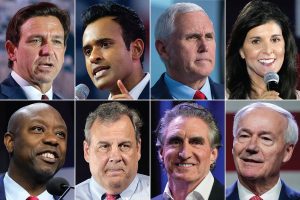Eminem’s legal team has taken action, demanding that GOP presidential candidate Vivek Ramaswamy cease using the song “Lose Yourself” at campaign events due to a reported breach of agreement.
The renowned rapper’s representatives have reached out to BMI, indicating their objection to the unauthorized use of his music in Ramaswamy’s campaign. This move underscores the significance of respecting copyright and licensing, even in the political sphere.
Also Read: Who are Elton John’s children, Zachary and Elijah Furnish-John?
BMI, Eminem’s label, has issued a cease and desist letter to Ramaswamy, urging him to discontinue the use of the song on his 2024 campaign trail. The letter from BMI warns that any further performance of Eminem’s works by Ramaswamy’s campaign could be deemed a material breach of their agreement, leading to potential legal repercussions.
The campaign, in response to the legal action taken by Eminem’s team, has expressed its intent to honor the request and halt the use of “Lose Yourself” in its events. This situation highlights the importance of recognizing and respecting the rights of artists to control the use of their creative works, regardless of the context in which they are employed.
The controversy surrounding Ramaswamy’s use of Eminem’s music adds to a series of recent controversies he has been involved in. These include his statements about progressive anti-racists and conflicting remarks about the January 6th insurrection. The incident serves as a reminder that the intersection of music and politics comes with legal and ethical considerations that should not be overlooked.
This episode raises pertinent questions about the boundaries of copyright in the realm of political campaigns. While artists may have their own political leanings, their rights over the commercial use of their creations remain protected by law. Eminem’s stance emphasizes the significance of abiding by copyright laws and respecting licensing agreements, even when music becomes a backdrop to political messaging.







